Books by Nicole Immler
Transcript: Bielefeld, 2011
Studienverlag: Innsbruck/Wien/Bozen, 2009
Published articles by Nicole Immler
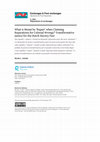
Slaveries & Post-Slaveries, 2021
While Transitional Justice instruments have been implemented in plenty of post-conflict cases, wh... more While Transitional Justice instruments have been implemented in plenty of post-conflict cases, what little knowledge we have about the effects of these measures shows contradictory findings, indicating that they are often ambiguous and disappointing. Consequently the last decade has seen a specific call for a ‘new agenda for practice’ proposing a transition from Transitional Justice to Transformative Justice. It is a request by scholars such as Paul Gready and Simon Robins (2014) to develop from the bottom-up a concept of justice that is more ‘transformative,’ specifically challenging ‘unequal and intersecting power relationships and structures of exclusion at both the local and the global level’. This article contributes to this consideration by exploring the Dutch debate on its slavery past with the following question: how could reparations—fundamental in the debate around the acknowledgment of the slavery past—facilitate transformative justice? In the Netherlands over the last decade, memory and reparation activists seeking recognition for slavery and the transatlantic slave trade have been influenced by two major events; the 10-point reparation claim put forward by the Caribbean CARICOM countries against the formerly colonizing powers in Europe (2013), and the UN-International Decade for People of African Descent (2015-2024). This article describes the reparation claims articulated by various groups in and outside the Netherlands addressing the slavery past of the Dutch and some of the institutional responses. Reparations have gained little conceptual attention in transitional justice scholarship, and in investigating the concept of reparation we refer to Lisa Laplante’s (2013) dictum, which is that ‘Reparations can and should be viewed through a lens of justice’. Laplante made an important intervention in the field by asking which reparations contribute to what kind of justice. Reading the Dutch question through the lens of Laplante’s continuum justice model (2013) makes it possible to identify different justice claims made by interested and affected parties. Laplante’s model ranges from a narrow (minimalist) to a broader (maximalist) conceptualisation of justice; distinguishing four types of justice aims: reparative justice, restorative justice, civic justice and socio-economic justice. All four types are relevant when considering the various options a government and a society have in dealing with (historical) injustice. The empirical findings suggest that current reparation claims in Afro-Caribbean and Surinamese communities are less about a specific product (such as an apology or reparations) but rather about a social process of relation building (such as addressing structural injustices). This notion of ‘social repair’ challenges and extends our current understanding of what justice for historical wrongs is about, but—as is argued in this article—it will at the same time also make reparations more acceptable to larger parts of Dutch society. It avoids the narrow ‘blame-and-guilt’ framework associated with reparations in politics and the media, which exacerbates the problem of acceptance in the first place.
The key arguments in this article firstly show that reparation theory is essential in identifying the kind of claims for justice that are being made, and secondly evaluate whether those claims are being addressed. Laplante helps us to see that if these justice goals of social repair are not clearly articulated and addressed, we would be likely to disappoint memory politics and memory activists, who ‘may compromise the overall justice project,’ thus jeopardising the potential for a transformative outcome.
The notion of social repair, as proposed in this article, recognizes a joint struggle for a more fair and equal society.

The UN-Sustainable Development Goals going local: learning from localising human rights
The International Journal of Human Rights, 2021
In 2015 the United Nations declared an ambitious programme, the Sustainable Development Goals (SD... more In 2015 the United Nations declared an ambitious programme, the Sustainable Development Goals (SDGs). With similar aspirations to the Universal Declaration of Human Rights in 1948, the SDGs claim is to make a difference in terms of justice and sustainability on a global scale. Both UN frameworks speak to the global imagination, but what do they do in (local) practice(s)? Recently the claim was made that human rights are ‘not enough’ (Samuel Moyn); but are the SDGs going to be enough? While current research focuses on the governance aspect of the SDGs and the efficiency of their implementation by national governments, little attention has been paid to the localisation process. Exploring the SDGs as a social imaginary of a moral order (Charles Taylor) and linking this to a framework of ‘localizing human rights’, we determine whether and in what way the SDGs might be a source of inspiration in some pioneering city-initiatives. Developing a typology of localisation approaches we argue for a move from the dominant implementation approach towards a translation one (foregrounding culture and human rights) to enable more reciprocity between the local and the global and therewith to take locality more seriously in realising the SDGs promise for change.
Impact Magazine, ARQ Nationaal Psychotrauma Centrum, 2020
Erkenning – de behoefte om gehoord en gezien te worden – heeft de laatste decennia als fenomeen z... more Erkenning – de behoefte om gehoord en gezien te worden – heeft de laatste decennia als fenomeen zowel in het publieke debat als in de wetenschap toenemende aandacht gekregen. Om erkenning vragen betekent dat iets gezien, toegegeven en hersteld moet worden. In mijn onderzoek Narratives of (In)justice richte ik me op de vraag hoe historische gebeurtenissen nog steeds in onze samenleving doorwerken. Hoe worstelt Nederland met zijn gewelddadig verleden en waar zijn mensen naar op zoek als zij om erkenning vragen?
Voorbij een nationale geschiedschrijving : De massaexecutie in Rawagede verteld als ‘vervlochten geschiedenis’
Tijdschrift Voor Geschiedenis, 2020
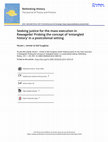
Rethinking History, 2020
In the Netherlands, the nation's imperial past is under new scrutiny since a landmark decision of... more In the Netherlands, the nation's imperial past is under new scrutiny since a landmark decision of the Civil Court in The Hague in 2011 held the Dutch state responsible for a mass execution perpetrated in 1947, during the Indonesian war of independence (1945-1949). This paper explores some of the historiographical implications of this triumph of law, arguing that it has had the unintended effect of reinforcing the representation of the conflict along 'national' frames at the expense of the more 'entangled' experiences of the actors involved. The authors hereby respond to Remco Raben's call to write 'trans-colonial' history in order to overcome the dominance of national frames in Dutch postcolonial historiogra-phy. By bringing the prehistory and the afterlife of the court case to the fore, the authors show how 'entangled' the (hi)stories of veterans, victims, and activists are, and how alternative 'frames' than that of the nation state, could contribute to develop the much awaited postcolonial historiography.
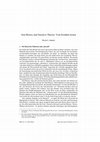
BIOS (Zeitschrift für Biographieforschung, Oral History und Lebenslaufanalysen), 2019
Der Status der Oral History hat sich in den letzten Jahren deutlich verändert. Aus einer Methode ... more Der Status der Oral History hat sich in den letzten Jahren deutlich verändert. Aus einer Methode aktivistischer Geschichtsforscher*innen, die sich am Rande der Geschichts-wissenschaften bewegten, um „Geschichte von unten“ zu schreiben, um jenen eine Stimme zu verleihen, die keine hatten, hat sich mittlerweile eine respektierte Wissen-schaftsdisziplin entwickelt. Ein paar Klicks im Internet machen deutlich: Wachsende Oral History-Archive weltweit beherbergen abertausende von Interviews, insbesondere zur Gewaltgeschichte des 20. und 21. Jahrhunderts ebenso wie zur Sozialgeschichte verlorener wie gegenwärtiger „alternativer“ Lebenswelten. Das digitale Zeitalter macht viele dieser Interviews öffentlich zugänglich. Doch welche Herausforderungen ergeben sich daraus für Wissenschaft und Lehre? Angesichts der Vielzahl zugänglicher Inter-views beschleicht mich eine gewisse Ohnmacht und die beunruhigende Frage: Haben die Sammlungen den politischen Effekt bewirkt, den man sich von ihnen versprochen hatte, nämlich den einer demokratisierenden Geschichtsschreibung? Oder ist Oral His-tory vor allem eine Strategie des Sammelns und Archivierens für den Historiker/die Historikerin der Zukunft geworden? Wird über Benutzungspolitiken und -praktiken ge-nug gesprochen bzw. werden die Stimmen gehört?

Hoe koloniaal onrecht te erkennen? De Rawagede-zaak laat kansen en grenzen van (rechts)herstel zien
BMGN - Low Countries Historical Review, 2018
In 2011, the Dutch colonial past entered the courtroom. In a historical judgment the Civil Court ... more In 2011, the Dutch colonial past entered the courtroom. In a historical judgment the Civil Court in The Hague declared the Dutch state liable for the mass execution in Rawagede on West Java in 1947, carried out by Dutch soldiers during the Indonesian War of Independence (1945-1949). Bringing historical injustice to court is a trend. At the same time, the shortcomings and unintended effects of such legal arrangements have become visible. While the debate among historians mainly focuses on the Netherlands, interviews with persons involved in Indonesia show the effects of the lawsuits, and therewith the opportunities and limits of apology and financial compensation as instruments of recognition. Only the confrontation of the Dutch and the Indonesian perspective, as this article argues, will show how closely intertwined questions of historiography and justice are.
In 2011 werd het Nederlandse koloniale verleden een rechtszaak. In een historische uitspraak verklaarde de rechtbank in Den Haag de Nederlandse staat aansprakelijk voor de massa-executie in Rawagede op West-Java in 1947, uitgevoerd door Nederlandse militairen tijdens de Indonesische onafhankelijkheidsoorlog (1945-1949). Historisch onrecht voor de rechter brengen is een trend. Tegelijkertijd wordt in toenemende mate duidelijk wat de tekortkomingen en bijwerkingen van dit type juridische zaken zijn. Terwijl het debat tussen historici zich vooral op Nederland richt, tonen interviews met betrokkenen in Indonesië wat de effecten van de rechtszaken ter plekke zijn en daarmee ook wat de kansen en de grenzen zijn van officiële excuses en financiële compensatie als instrumenten voor erkenning. De confrontatie van het Nederlandse en het Indonesische perspectief, zo wordt in dit artikel beargumenteerd, maakt zichtbaar hoe verstrengeld kwesties betreffende geschiedschrijving en rechtvaardigheid zijn.

In: Understanding the Age of Transitional Justice: Crimes, Courts, Commissions, and Chronicling, ed. by Nanci Adler. Rutgers University Press, 2018
Ever since a landmark decision in September 2011 in the Civil Court in The Hague, we know their f... more Ever since a landmark decision in September 2011 in the Civil Court in The Hague, we know their faces and have heard their voices: Pak (Mr) Saih and Ibu (Mrs) Sariman, Ibu Layem, and Ibu Cawi; a survivor and elderly widows, whose husbands were executed by the Dutch military in a small village in Java, Rawagede (today Balongsari) in the year 1947. At that time the Dutch were fighting a decolonization war, trying to keep ‘their’ colony, while Indonesia––after the Japanese occupation during World War II had ended Dutch rule––had declared its independence and an end to 350 years of colonial power on 17 August 1945. Only international pressure and the realization that the war could not be won, finally pushed the Dutch to formally acknowledge Indonesian sovereignty in December 1949.
The widows and one survivor (respectively their representatives) sued the Dutch government to acknowledge colonial faults, and won. In the Dutch media, on photographs, we see individuals, but behind their faces are many others, who (feel they) have the same history. They represent those who never made it to speak with a journalist or to testify in The Hague. We hear the stories of a few, who, however, as new claimants and consecutive court cases show, tell the story of a larger collective; but which collective? What do we know about these widows and their ideas of justice? What do they expect from the Netherlands 70 years after the decolonization war has ended? And what has happened after the historical injustice was acknowledged (by a court in several decisions), an apology was made (by an ambassador and two ministers) and development aid (for the village) and compensation (to some individuals) was given? Do such measures -- as claimed by the human rights movement --provide victims with recognition, and more, namely emancipation of individuals and transformation of societies (in the sense of overcoming old identity-positions people inherited from the past)?
Transitional Justice has been called the hegemonic discourse of our time, however, as critics say, this statement is based more on faith than facts. The literature and practice is dominated by strong beliefs in Transitional Justice’s toolbox of reparative and restorative measures, while there is much less empirical knowledge about the impact of these measures on individual and social level. Most of the attention is devoted to bringing those measures into place, not to monitoring their effects. This chapter aims to do the latter. Based upon field work, this essay critically assesses the effects of such reparative measures in order to draw lessons from the ‘Rawagede case’ for similar cases of historical injustice; aiming at a better understanding of how justice is experienced from bottom-up. Particularly it explores the challenges of court cases on behalf of a group of individuals in a postcolonial setting, asking whether the legal approach, based upon individual cases, is an adequate approach to colonial crimes.
In: Social Imaginaries in a Globalizing World, ed. by Hans Alma and Guy Vanheeswijk, De Gruyter, 2018

In: Memory Studies, 2012, 5 (3), 270-281
Monetary compensation to victims of historical injustice is a worldwide political and academic th... more Monetary compensation to victims of historical injustice is a worldwide political and academic theme; however, it is rarely seen in the light of family memory. This article, based on evidence from 90 semi-structured interviews, explores the impact of official policies on individuals and families involved in the reparation procedures set up in the 1990s by the Austrian state for the victims of National Socialism. It focuses on the meaning of the oft-voiced complaint 'too little, too late', arguing that there is a difference between what the phrase has commonly been understood to mean (a critical evaluation of the compensation efforts) and what analysis shows it to mean in the frame of 'family memory'. The article argues that while this narrative of anger at first sight boycotts a dialogue, it also has an important performative and empowering function as well as an integrative function within the 'post-memory' generation. Exploring the mutual influence of compensation reception and family memory will help to theorize the role of anger in reconciliation processes.

In: Journal for European Studies, 2014
Celebrating the 25th anniversary of the European Capital of Culture (ECoC) programme in 2010 as
... more Celebrating the 25th anniversary of the European Capital of Culture (ECoC) programme in 2010 as
a success story for the cities and member states involved, the European Commission also registered
a ‘lack of Europe’ in the programme. This is reflected in the scholarly literature, which has largely
focused on the title’s effects on individual cities rather than on its effects on Europe. The startingpoint
of this article is the demand of the European Commission for a stricter implementation of new
guidelines developed since 2006 for enhancing the European dimension. After situating the history
of the event and its idea of ‘unity in diversity’ within the wider context of thoughts on Europe as
an ‘imagined community’, this article investigates how Europe is presented in earlier and more
recent ECoC bidbooks and programmes. We argue that an observed slight shift in the programme’s
content, from a competition-based marketing of local identity towards a more universal value
discourse, could be read as a first step towards (re)formulating the European dimension. We
suggest that this emerging value paradigm also illustrates how such cultural programmes as a kind of
laboratory could contribute to a conceptual reflection on (and beyond) Europe.
In: BIOS, 2011, 1, 53–77.
In: Neighbours and Strangers. Literary and Cultural Relations in Germany, Austria and Cultural Europe since 1989, ed. by Ian Foster, Juliet Wigmore (Eds), Rodopi: Amsterdam/New York 2004, 173–196.
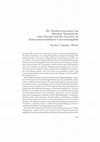
In: Schauplatz Kultur – Zentraleuropa. Transdisziplinäre Annäherungen, hg. v. Johannes Feichtinger, Heidemarie Uhl u.a., (Gedächtnis – Erinnerung – Identität 7) Studienverlag: Innsbruck/Wien/Bozen 2006, 149–158
Im Jahr 2006 werden die Familienerinnerungen von Hermine Wittgenstein, der ältesten Schwester von... more Im Jahr 2006 werden die Familienerinnerungen von Hermine Wittgenstein, der ältesten Schwester von Ludwig Wittgenstein, erstmals vollständig veröffentlicht werden. 1 Das ist der richtige Moment, um die Frage zu stellen, was ein solcher Text für die Wissenschaft bedeutet und welche Bedeutung das Verfassen einer Familiengeschichte für die Autorin wie für die ganze Familie hatte und noch heute hat. Lange gab es Zweifel am Wert dieses Schriftstücks, seitens der Familie wie auch der Wittgenstein-Forschung, denn viele Forscher betrachten Familienchroniken aufgrund ihres subjektiven Charakters als unzuverlässige Quelle -doch eine kulturwissenschaftliche Analyse zeigt neue und spannende Lesarten dieses Textes auf. Einige werde ich nachfolgend präsentieren. 2
In: Erfahrung und Analyse, hg. v. Johann C. Marek, Maria E. Reicher (27. Int. Wittgenstein Symposium, Vol. XII) Kirchberg 2004, 147–150
In: Zeit und Geschichte, hg. v. Friedrich Stadler, Michael Stöltzner (28. Int. Wittgenstein Symposium, Vol. XIII) Kirchberg 2005, 113–116.
Reviews by Nicole Immler
Onderzoek uitgelicht. ed. by Nationaal Comité 4 en 5 men, 2016 (2), 27-33. Article review by Ellen-Rose Kambel







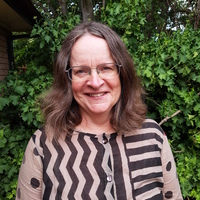
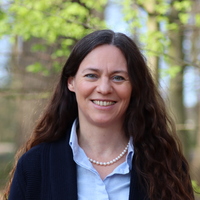


Uploads
Books by Nicole Immler
Published articles by Nicole Immler
The key arguments in this article firstly show that reparation theory is essential in identifying the kind of claims for justice that are being made, and secondly evaluate whether those claims are being addressed. Laplante helps us to see that if these justice goals of social repair are not clearly articulated and addressed, we would be likely to disappoint memory politics and memory activists, who ‘may compromise the overall justice project,’ thus jeopardising the potential for a transformative outcome.
The notion of social repair, as proposed in this article, recognizes a joint struggle for a more fair and equal society.
In 2011 werd het Nederlandse koloniale verleden een rechtszaak. In een historische uitspraak verklaarde de rechtbank in Den Haag de Nederlandse staat aansprakelijk voor de massa-executie in Rawagede op West-Java in 1947, uitgevoerd door Nederlandse militairen tijdens de Indonesische onafhankelijkheidsoorlog (1945-1949). Historisch onrecht voor de rechter brengen is een trend. Tegelijkertijd wordt in toenemende mate duidelijk wat de tekortkomingen en bijwerkingen van dit type juridische zaken zijn. Terwijl het debat tussen historici zich vooral op Nederland richt, tonen interviews met betrokkenen in Indonesië wat de effecten van de rechtszaken ter plekke zijn en daarmee ook wat de kansen en de grenzen zijn van officiële excuses en financiële compensatie als instrumenten voor erkenning. De confrontatie van het Nederlandse en het Indonesische perspectief, zo wordt in dit artikel beargumenteerd, maakt zichtbaar hoe verstrengeld kwesties betreffende geschiedschrijving en rechtvaardigheid zijn.
The widows and one survivor (respectively their representatives) sued the Dutch government to acknowledge colonial faults, and won. In the Dutch media, on photographs, we see individuals, but behind their faces are many others, who (feel they) have the same history. They represent those who never made it to speak with a journalist or to testify in The Hague. We hear the stories of a few, who, however, as new claimants and consecutive court cases show, tell the story of a larger collective; but which collective? What do we know about these widows and their ideas of justice? What do they expect from the Netherlands 70 years after the decolonization war has ended? And what has happened after the historical injustice was acknowledged (by a court in several decisions), an apology was made (by an ambassador and two ministers) and development aid (for the village) and compensation (to some individuals) was given? Do such measures -- as claimed by the human rights movement --provide victims with recognition, and more, namely emancipation of individuals and transformation of societies (in the sense of overcoming old identity-positions people inherited from the past)?
Transitional Justice has been called the hegemonic discourse of our time, however, as critics say, this statement is based more on faith than facts. The literature and practice is dominated by strong beliefs in Transitional Justice’s toolbox of reparative and restorative measures, while there is much less empirical knowledge about the impact of these measures on individual and social level. Most of the attention is devoted to bringing those measures into place, not to monitoring their effects. This chapter aims to do the latter. Based upon field work, this essay critically assesses the effects of such reparative measures in order to draw lessons from the ‘Rawagede case’ for similar cases of historical injustice; aiming at a better understanding of how justice is experienced from bottom-up. Particularly it explores the challenges of court cases on behalf of a group of individuals in a postcolonial setting, asking whether the legal approach, based upon individual cases, is an adequate approach to colonial crimes.
a success story for the cities and member states involved, the European Commission also registered
a ‘lack of Europe’ in the programme. This is reflected in the scholarly literature, which has largely
focused on the title’s effects on individual cities rather than on its effects on Europe. The startingpoint
of this article is the demand of the European Commission for a stricter implementation of new
guidelines developed since 2006 for enhancing the European dimension. After situating the history
of the event and its idea of ‘unity in diversity’ within the wider context of thoughts on Europe as
an ‘imagined community’, this article investigates how Europe is presented in earlier and more
recent ECoC bidbooks and programmes. We argue that an observed slight shift in the programme’s
content, from a competition-based marketing of local identity towards a more universal value
discourse, could be read as a first step towards (re)formulating the European dimension. We
suggest that this emerging value paradigm also illustrates how such cultural programmes as a kind of
laboratory could contribute to a conceptual reflection on (and beyond) Europe.
Reviews by Nicole Immler
The key arguments in this article firstly show that reparation theory is essential in identifying the kind of claims for justice that are being made, and secondly evaluate whether those claims are being addressed. Laplante helps us to see that if these justice goals of social repair are not clearly articulated and addressed, we would be likely to disappoint memory politics and memory activists, who ‘may compromise the overall justice project,’ thus jeopardising the potential for a transformative outcome.
The notion of social repair, as proposed in this article, recognizes a joint struggle for a more fair and equal society.
In 2011 werd het Nederlandse koloniale verleden een rechtszaak. In een historische uitspraak verklaarde de rechtbank in Den Haag de Nederlandse staat aansprakelijk voor de massa-executie in Rawagede op West-Java in 1947, uitgevoerd door Nederlandse militairen tijdens de Indonesische onafhankelijkheidsoorlog (1945-1949). Historisch onrecht voor de rechter brengen is een trend. Tegelijkertijd wordt in toenemende mate duidelijk wat de tekortkomingen en bijwerkingen van dit type juridische zaken zijn. Terwijl het debat tussen historici zich vooral op Nederland richt, tonen interviews met betrokkenen in Indonesië wat de effecten van de rechtszaken ter plekke zijn en daarmee ook wat de kansen en de grenzen zijn van officiële excuses en financiële compensatie als instrumenten voor erkenning. De confrontatie van het Nederlandse en het Indonesische perspectief, zo wordt in dit artikel beargumenteerd, maakt zichtbaar hoe verstrengeld kwesties betreffende geschiedschrijving en rechtvaardigheid zijn.
The widows and one survivor (respectively their representatives) sued the Dutch government to acknowledge colonial faults, and won. In the Dutch media, on photographs, we see individuals, but behind their faces are many others, who (feel they) have the same history. They represent those who never made it to speak with a journalist or to testify in The Hague. We hear the stories of a few, who, however, as new claimants and consecutive court cases show, tell the story of a larger collective; but which collective? What do we know about these widows and their ideas of justice? What do they expect from the Netherlands 70 years after the decolonization war has ended? And what has happened after the historical injustice was acknowledged (by a court in several decisions), an apology was made (by an ambassador and two ministers) and development aid (for the village) and compensation (to some individuals) was given? Do such measures -- as claimed by the human rights movement --provide victims with recognition, and more, namely emancipation of individuals and transformation of societies (in the sense of overcoming old identity-positions people inherited from the past)?
Transitional Justice has been called the hegemonic discourse of our time, however, as critics say, this statement is based more on faith than facts. The literature and practice is dominated by strong beliefs in Transitional Justice’s toolbox of reparative and restorative measures, while there is much less empirical knowledge about the impact of these measures on individual and social level. Most of the attention is devoted to bringing those measures into place, not to monitoring their effects. This chapter aims to do the latter. Based upon field work, this essay critically assesses the effects of such reparative measures in order to draw lessons from the ‘Rawagede case’ for similar cases of historical injustice; aiming at a better understanding of how justice is experienced from bottom-up. Particularly it explores the challenges of court cases on behalf of a group of individuals in a postcolonial setting, asking whether the legal approach, based upon individual cases, is an adequate approach to colonial crimes.
a success story for the cities and member states involved, the European Commission also registered
a ‘lack of Europe’ in the programme. This is reflected in the scholarly literature, which has largely
focused on the title’s effects on individual cities rather than on its effects on Europe. The startingpoint
of this article is the demand of the European Commission for a stricter implementation of new
guidelines developed since 2006 for enhancing the European dimension. After situating the history
of the event and its idea of ‘unity in diversity’ within the wider context of thoughts on Europe as
an ‘imagined community’, this article investigates how Europe is presented in earlier and more
recent ECoC bidbooks and programmes. We argue that an observed slight shift in the programme’s
content, from a competition-based marketing of local identity towards a more universal value
discourse, could be read as a first step towards (re)formulating the European dimension. We
suggest that this emerging value paradigm also illustrates how such cultural programmes as a kind of
laboratory could contribute to a conceptual reflection on (and beyond) Europe.